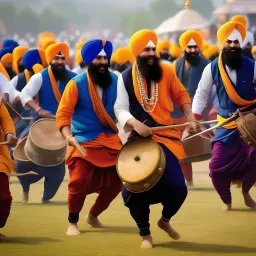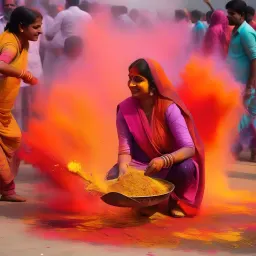Celebrate the Colors of Joy: Holi 2024 Date and Festive Delights

When is Holi in 2024?
Also known as Rangwali Holi - ‘Festival of Colors’ or the ‘Festival of Love’.
- When: Monday 25 March, 2024
- In India, mainly celebrated in - Northern region of India, particularly in the states of Uttar Pradesh, Haryana, and Delhi.
- The Holi festivities in Mathura and Vrindavan begin a week before the actual festival.
Get ready to immerse yourself in the kaleidoscope of colors! Holi, the jubilant festival known for its lively ambiance and vivid hues, will be celebrated on Monday 25 March, 2024. As we eagerly await this exuberant occasion, let's delve into the vibrancy, customs, and sheer joy that envelops this spirited festival.
1.Embracing the Spirit of Holi
Holi, often referred to as the "Festival of Colors," transcends geographical boundaries, uniting people in a kaleidoscope of joy and camaraderie. Observed with enthusiasm across India and various parts of the world, this festival symbolizes the triumph of good over evil and the arrival of spring.
2.Date and Significance of Holi 2024
In 2024, Holi falls on Monday 25 March, 2024, marking the culmination of winter and the advent of spring. This auspicious occasion holds a rich historical and cultural significance, tracing back to ancient Hindu mythology. The festivities begin with Holika Dahan, a ritual where bonfires are lit to symbolize the victory of righteousness over malevolence.
3.Celebratory Traditions and Rituals
The heart of Holi lies in its traditions. People gather to drench each other in vibrant colored powders and water, spreading joy and love. From smearing friends and family with gulal (colored powder) to relishing traditional sweets like gujiya and thandai, every ritual radiates exuberance and togetherness.
4.Spreading Love and Unity
Holi transcends barriers, fostering unity and spreading the message of love and harmony. It's a time when differences dissolve, and laughter echoes through the streets. Communities come together, sharing laughter, dance, and the spirit of brotherhood.
5.Preparations and Festive Excitement
The days leading up to Holi are filled with anticipation. Markets bustle with people purchasing vibrant colors, water guns (pichkaris), and delectable sweets. The air buzzes with excitement as everyone eagerly awaits the joyous revelry.
6.Holi's Global Appeal
Beyond India's borders, Holi's popularity has spread worldwide. Its vivacity attracts tourists and enthusiasts from various corners of the globe, igniting an interest in Indian culture and traditions.
7.Conclusion: Embrace the Colors of Holi 2024
What is Holi?
Holi is a vibrant and colorful Hindu festival celebrated to mark the arrival of spring. Also known as the Festival of Colors, it signifies the victory of good over evil and is a time for joy, love, and togetherness.
When is Holi celebrated?
Holi is celebrated on the full moon day of the Hindu month of Phalgun, which usually falls in March on the Gregorian calendar. The festival is observed over two days, with Holika Dahan on the first night and Rangwali Holi on the following day.
How is Holika Dahan celebrated?
Holika Dahan, also known as Choti Holi, involves lighting bonfires on the eve of Holi. It symbolizes the victory of good over evil, and people gather around the fire, sing and dance, and perform rituals to ward off negativity.
What happens on Rangwali Holi?
Rangwali Holi, the main day of Holi, is characterized by the playful throwing of colored powders and water at each other. People come together to celebrate, dance, sing, and enjoy festive foods. It's a day of joy, laughter, and bonding.
Is Holi only celebrated by Hindus?
While Holi has Hindu roots, it has become a secular and inclusive celebration in many parts of India and around the world. People of various religions and communities participate in the festivities, emphasizing unity and cultural diversity.
What are traditional Holi foods?
Traditional Holi foods include sweets like gujiya and jalebi, as well as savory snacks like samosas and chaat. Thandai, a cold beverage with nuts and spices, is also a popular Holi drink.
How is Holi celebrated in different regions of India?
Holi is celebrated with various customs and traditions across different regions of India. For example, in Mathura and Vrindavan, it is celebrated with grand processions and plays depicting the life of Lord Krishna.
Are there any safety precautions during Holi celebrations?
To ensure a safe Holi, it's advisable to use natural and non-toxic colors, protect the eyes, and stay hydrated. It's also recommended to be mindful of others' comfort levels and consent during the festivities.
What is the significance of Holi in Hindu mythology?
Holi is associated with different Hindu myths, including the story of Prahlada and Holika or the divine love of Radha and Krishna. The festival symbolizes the victory of good over evil and the arrival of spring.
Are there any variations of Holi celebrated in other cultures?
Some communities and regions have their own variations of Holi-like festivals. For instance, the Lathmar Holi in Barsana involves women playfully hitting men with sticks, showcasing a unique and colorful cultural celebration.
As the countdown to Holi 2024 begins, let's gear up to embrace this festival with open arms. It's more than just a celebration; it's a reflection of unity, joy, and the vibrancy of life itself. Join in the jubilation, mark your calendars, and get ready to immerse yourself in the kaleidoscope of colors on Monday 25 March, 2024.
Read Next
Celebrate Holi: Immerse Yourself in India's Vibrant Festival of Colors! Experience the Vibrant Festival of Holi: A German Tourist's Journey in India Why Do We Celebrate Holi? Exploring the Religious Significance and Holika Dahan Story Discover the Lath Maar Holi Festival: A Spectacular Celebration of Colors in India Discover Bengaluru's Top Holi GetawaysWalking Tours from Tripazy.com



